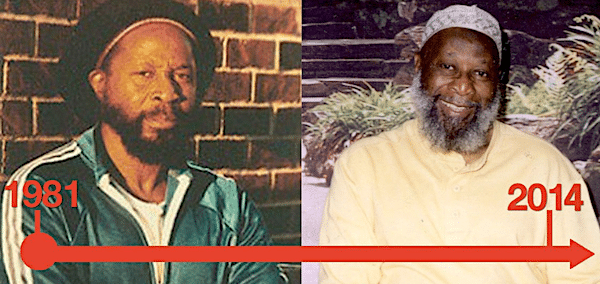Brother, comrade, Father, New African, Sekou Odinga took his last breath in this world on January 12, 2024, ending a life of service and sacrifice not matched by many. Brother Sekou loved our people and he loved all of the oppressed and gladly dedicated his life to the liberation of the colonized, oppressed people of the world because that is indeed what the “Black Liberation Movement” embodied. Brother Sekou understood, like all of the warriors of our people from the time we plotted at the bottom of slave ships, in the cotton fields, in Massa’s house, in the urban ghettos and rural plantations, that authentic liberation would only materialize when we physically defeated the original colonial “motherfuckers,” slavers, genocidal, imperialist criminals that held us and the world in their grip.
That defeat would not come about from patient and respectable appeals but as George Jackson, Karl Marx and Mao Zedong understood—material force would only be defeated by material force. He understood that all the “wolf tickets,” and huffing and puffing in the world would not blow down the imperialist house, the empire had to be defeated and, therefore, we had an obligation to create the necessary tools to bring about that defeat. That is precisely why the Black Liberation Army was formed!
But that understanding did not come to him in a flash. His experiences as a colonized subject in the most brutal, backward, racist, violent society in human history meant that like so many of us he had three paths—he could be a nigger, a Negro or a revolutionary.
Like Frankenstein’s monster, a nigger is no more than a creation of white society. It is a state of “pre-consciousness” where the individual is reduced to an instrument against their own community, a predator filled with self-hate and contempt for his own kind who is conditioned to engage in self-destructive and anti-social acts. It is a condition many of our revolutionaries passed through from this author to Malcolm, George Jackson to Sekou Odinga who by the age of sixteen was already doing time for a robbery.
A Negro is also a freak, a creation more deranged and dangerous for our people than the Nigger, because the Negro is usually in some kind of institutional position where their actions on behalf of white power can have a much more devastating impact for larger numbers of people than the acts of a Nigger. We see these freaks in charge of administrating the colonial relationship—the “Black misleadership class,” or more accurately the petit-bourgeois protecting “cop cities,” unleashing violence against our people, representing white power at the United Nations and even now sitting in the white peoples’ house in Washington D.C.
And then there is the revolutionary. The path that brother Sekou eventually took. The revolutionary that understands “what must be done” and is prepared to do it. Who has the discipline to plan, study and struggle. Who engages in criticism and self-criticism, never believing that they are above the masses, who patiently, lovingly, struggles with the backwardness of our people who have been subjected to white supremacist ideology from the time they could understand language.
Born in Queens, New York with one foot already in the grave, kicked out of school by 16 and doing time, Sekou made a decision not to accept niggerhood. He was introduced to another perspective on the meaning of his life and ours. He listened to Minister El-Hajj Malik El-Shabazz (Malcolm X) and joined Malcolm’s Organization of Afro-American Unity in 1965 right before the minister was assassinated.
But with the assassination of Malcolm, brother Sekou says that he decided to take another route toward consciousness and service and in 1968 was a founding member of the New York Chapter of the Black Panther Party.
1969 was a year of aggressive repression of the Black liberation movement with members of the Black Panther Party (BPP) and other revolutionary organizations being targeted for death and incarceration by the U.S. national security state with the FBI in the lead but with support from every element of the state, including the CIA that was not supposed to be in the business of domestic policing. Across the country, the enemy was assassinating our soldiers and activists in what was clearly a war against our movement.
Sekou decided to go underground in April of 1969 when after hearing that state agents were looking for him, he found himself surrounded by enemy soldiers at his apartment early one morning before performing one of his many escapes. From that point on he devoted most of his energy to the Black Liberation Army until his capture in 1981.
With his capture, Sekou was held in state and federal concentration camps, prisons, for 33 years. Even captured, brother Sekou continued his political work. That work continued after he walked out of prison, unbroken and unbowed.
We loved brother Sekou. As brother Akinyela Umoja, the author of “We Will Shoot Back” said, Sekou Odinga “must be remembered as one of the great soldiers and heroes of our peoples fight for independence and self-determination.”
So, we shed some tears for our dear brother. But we also allow ourselves to be reminded, especially coming a few weeks after another soldier, brother Ralph Poynter passed, of the character of our people, our resilience, our ability to never surrender our dignity and for those of us who can still hear the drums, of our determination to decisively defeat our enemy—the U.S./EU/NATO Axis of Domination—that force that threatens the entire world.
Brother Sekou, brother Ralph, we will never forget you. Your spirits will live on with us. So even though we say goodbye, as African people we know that you still live. You live in us, in our aspirations, in our organizations, in our dreams for freedom.
We will continue. And as night follows the day, we know the certainty of our victory.
Victory or Death, Long Live the Black Liberation Army! Long Live all of our Freedom Fighters!

